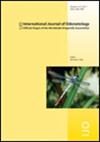骚扰还是尊重:豆娘在争夺配偶竞争中不顾雌性拒绝的雄性坚持的经济
IF 1
4区 农林科学
Q3 ENTOMOLOGY
引用次数: 1
摘要
在性冲突中,雄性通常被认为通过骚扰雌性来获得健康利益。然而,当骚扰本身给雄性带来成本时,如果在当地种群中有其他的、愿意接受的雌性,理论预测,当面对雌性拒绝时,雄性选择坚持还是退出,部分取决于实现交配的可能性。我们在豆娘身上测试了这一预测,其雄性豆娘通过激烈的争夺竞争来竞争,导致对具有高度交配控制权的雌性的广泛交配骚扰。利用圈养的hageni幼虫,通过观察产卵前和产卵后的雌虫产卵量,量化雄虫在被拒绝后的交配坚持。我们记录了一种新颖的、依赖于情境的转头拒绝信号,这是一种性不接受的信号,最常出现在产卵后雌性的串联配对中,雌性通常携带很少的成熟卵子供雄性受精。与产卵前携带一窝成熟卵的雌性相比,雄性的持久性不太可能导致与产卵后的雌性交配。因此,雄性不太可能坚持接受产卵后雌性发出的拒绝信号,这支持了理论预测。与张开翅膀的拒绝信号相比,转头在阻止骚扰雄性方面明显更有效。我们的研究结果表明,尽管在交配方面存在着持续的性冲突,但当雌性使用不接受的诚实信号时,合作对两性都有好处,因为它们携带的成熟卵子很少,雄性可以受精。本文章由计算机程序翻译,如有差异,请以英文原文为准。
To harass or to respect: the economy of male persistence despite female refusal in a damselfly with scramble mate competition
In sexual conflict, males are often thought to gain fitness benefits from harassing females over mating. Yet when harassment itself incurs costs to males and if alternative, receptive females are available in a local population, theory predicts that when confronted with a female refusal, a male’s choice of persisting or retreating is determined in part by the likelihood of achieving a mating. We tested that prediction in the damselfly Enallagma hageni, whose males compete by intense scramble competition, resulting in widespread mating harassment toward females, which have a high level of control over mating. Using captive individuals of E. hageni in outdoor insectaries, we quantified male persistence in mating after refusals by pre- and post-oviposition focal females whose egg content we quantified after observations. We documented a novel, context-dependent head-turning refusal signal of sexual non-receptivity, most often displayed in tandem pairs by post-oviposition females that typically carried few mature eggs for males to fertilize. Male persistence was less likely to result in mating with post-oviposition females compared with pre-oviposition females carrying a clutch of mature eggs. Accordingly, males were less likely to persist following refusal signals given by post-oviposition females, supporting the theoretical prediction. Compared with a refusal signal known as wing spread, head-turning was significantly more effective in deterring harassing males. Our results suggest that despite on-going sexual conflict over mating, cooperation benefits both sexes when females use the honest signal of non-receptivity because they carry few mature eggs that males could fertilize.
求助全文
通过发布文献求助,成功后即可免费获取论文全文。
去求助
来源期刊

International Journal of Odonatology
ENTOMOLOGY-
CiteScore
2.30
自引率
0.00%
发文量
15
审稿时长
>12 weeks
期刊介绍:
International Journal of Odonatology (IJO) is aimed at providing a publication outlet for the growing number of students of Odonata. It will address subjects such as the ecology, ethology, physiology, genetics, taxonomy, phylogeny and geographic distribution of species. Reviews will be by invitation, but authors who plan to write a review on a subject of interest to the journal are encouraged to contact the editor.
 求助内容:
求助内容: 应助结果提醒方式:
应助结果提醒方式:


